

Wit. 'The feast of reason, and the flow of soul,' - i.e. - the wits of the age, setting the table in a roar, by James Gillray (1797) Wit is a form of intelligent humour, the ability to say or write things that are clever and usually funny.[1] A wit is a person skilled at making clever and funny remarks.[1] Forms of wit include the quip and repartee.

§Forms of wit[edit] As in the wit of Dorothy Parker's set, the Algonquin Round Table, witty remarks may be intentionally cruel (as in many epigrams), and perhaps more ingenious than funny. A quip is an observation or saying that has some wit but perhaps descends into sarcasm, or otherwise is short of a point, and a witticism also suggests the diminutive. Repartee is the wit of the quick answer and capping comment: the snappy comeback and neat retort. §Wit in poetry[edit] §Further meanings[edit] More generally, one's wits are one's intellectual powers of all types. Reason. Psychologists and cognitive scientists have attempted to study and explain how people reason, e.g. which cognitive and neural processes are engaged, and how cultural factors affect the inferences that people draw.
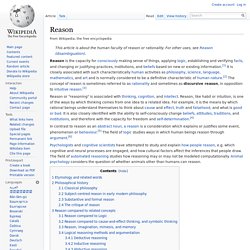
The field of automated reasoning studies how reasoning may or may not be modeled computationally. Animal psychology considers the question of whether animals other than humans can reason. Etymology and related words[edit] In the English language and other modern European languages, "reason", and related words, represent words which have always been used to translate Latin and classical Greek terms in the sense of their philosophical usage.
Understanding. Understanding (also called intellection) is a psychological process related to an abstract or physical object, such as a person, situation, or message whereby one is able to think about it and use concepts to deal adequately with that object.
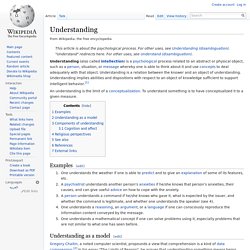
Understanding is a relation between the knower and an object of understanding. Understanding implies abilities and dispositions with respect to an object of knowledge sufficient to support intelligent behavior.[1] Intelligence. Intelligence is most widely studied in humans, but has also been observed in non-human animals and in plants.
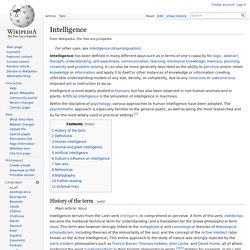
Artificial intelligence is the simulation of intelligence in machines. Reinforcement. This article is about the psychological concept.
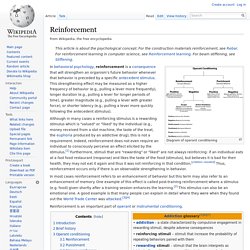
For the construction materials reinforcement, see Rebar. For reinforcement learning in computer science, see Reinforcement learning. Psychological manipulation. Psychological manipulation is a type of social influence that aims to change the perception or behavior of others through underhanded, deceptive, or even abusive tactics.[1] By advancing the interests of the manipulator, often at another's expense, such methods could be considered exploitative, abusive, devious, and deceptive.
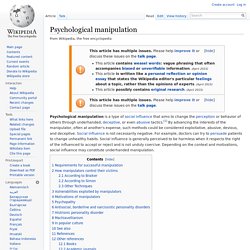
Social influence is not necessarily negative. For example, doctors can try to persuade patients to change unhealthy habits. Confirmation bias. Tendency of people to favor information that confirms or strengthens their beliefs or hypotheses Confirmation bias is the tendency to search for, interpret, favor, and recall information in a way that confirms or strengthens one's prior personal beliefs or hypotheses.[1] It is a type of cognitive bias.
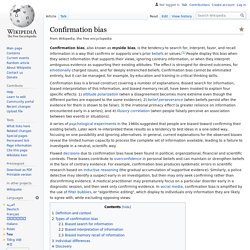
People display this bias when they gather or remember information selectively, or when they interpret it in a biased way. The effect is stronger for desired outcomes, for emotionally charged issues, and for deeply-entrenched beliefs. People also tend to interpret ambiguous evidence as supporting their existing position. A series of psychological experiments in the 1960s suggested that people are biased toward confirming their existing beliefs. Confirmation biases contribute to overconfidence in personal beliefs and can maintain or strengthen beliefs in the face of contrary evidence. Anchoring. Anchoring or focalism is a cognitive bias that describes the common human tendency to rely too heavily on the first piece of information offered (the "anchor") when making decisions.
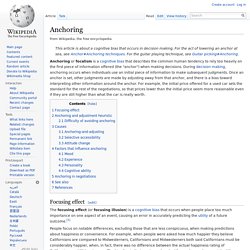
During decision making, anchoring occurs when individuals use an initial piece of information to make subsequent judgments. Once an anchor is set, other judgments are made by adjusting away from that anchor, and there is a bias toward interpreting other information around the anchor. For example, the initial price offered for a used car sets the standard for the rest of the negotiations, so that prices lower than the initial price seem more reasonable even if they are still higher than what the car is really worth. §Focusing effect[edit] Remorse. A person who is incapable of feeling remorse is often labelled with antisocial personality disorder - as characterized in the DSM IV-TR.
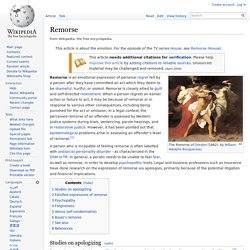
In general, a person needs to be unable to feel fear, as well as remorse, in order to develop psychopathic traits. Legal and business professions such as insurance have done research on the expression of remorse via apologies, primarily because of the potential litigation and financial implications. Studies on apologizing[edit] Two studies on apologizing are "The Five Languages of Apology" by Gary Chapman and Jennifer Thomas[2] and "On Apology" by Aaron Lazare.[3] These studies indicate that effective apologies that express remorse typically include a detailed account of the offense; acknowledgment of the hurt or damage done; acceptance of the responsibility for, and ownership of, the act or omission; an explanation that recognizes one's role.
Falsified expressions of remorse[edit] Outline of self. Self – individual person, from his or her own perspective.

To you, self is you. To a different person, self is that person. Life stages/events[edit] Gestalt therapy. Gestalt therapy is an existential/experiential form of psychotherapy that emphasizes personal responsibility, and that focuses upon the individual's experience in the present moment, the therapist-client relationship, the environmental and social contexts of a person's life, and the self-regulating adjustments people make as a result of their overall situation. §Overview[edit] Edwin Nevis described Gestalt therapy as "a conceptual and methodological base from which helping professionals can craft their practice".[1] In the same volume Joel Latner stated that Gestalt therapy is built upon two central ideas: that the most helpful focus of psychotherapy is the experiential present moment, and that everyone is caught in webs of relationships; thus, it is only possible to know ourselves against the background of our relationship to the other.[2] The historical development of Gestalt therapy (described below) discloses the influences that generated these two ideas.
Delayed gratification. Delayed gratification, or deferred gratification, is the ability to resist the temptation for an immediate reward and wait for a later reward. Generally, delayed gratification is associated with resisting a smaller but more immediate reward in order to receive a larger or more enduring reward later.[1] A growing body of literature has linked the ability to delay gratification to a host of other positive outcomes, including academic success, physical health, psychological health, and social competence. Walter Mischel has led the research on delayed gratification, most notably the Stanford marshmallow experiment, which shed light on the long-term results of a person's ability to delay gratification. A person's ability to delay gratification relates to other similar skills such as patience, impulse control, self-control and willpower, all of which are involved in self-regulation.
Several factors can affect a person's ability to delay gratification. §Background[edit] §Behavioral factors[edit] Insomnia. Insomnia, or sleeplessness, is a sleep disorder in which there is an inability to fall asleep or to stay asleep as long as desired.[1][2] While the term is sometimes used to describe a disorder demonstrated by polysomnographic or actigraphic evidence of disturbed sleep, this sleep disorder is often practically defined as a positive response to either of two questions: "Do you experience difficulty sleeping?
" or "Do you have difficulty falling or staying asleep? "[2] Cognitive flexibility. Cognitive flexibility has been described as the mental ability to switch between thinking about two different concepts, and to think about multiple concepts simultaneously.[1] Despite some disagreement in the literature about how to operationally define the term, one commonality is that cognitive flexibility is a component of executive functioning.[2] Research has primarily been conducted with children at the school age; however, individual differences in cognitive flexibility are apparent across the lifespan.[3] Measures for cognitive flexibility include the A-not-B task, Dimensional Change Card Sorting Task, Multiple Classification Card Sorting Task, Wisconsin Card Sorting Task, and the Stroop Test.
Functional Magnetic Resonance Imaging (fMRI) research has shown that specific brain regions are activated when a person engages in cognitive flexibility tasks. Gelotology. Gelotology (from the Greek gelos, meaning laughter) is the study of laughter and its effects on the body, from a psychological and physiological perspective. Its proponents often advocate induction of laughter on therapeutic grounds in alternative medicine. The field of study was pioneered by William F. Psychoanalysis. Psychoanalysis is a set of psychological and psychotherapeutic theories and associated techniques, originally popularized by Austrian physician Sigmund Freud and stemming partly from the clinical work of Josef Breuer and others. Since then, psychoanalysis has expanded and been revised, reformed and developed in different directions. This was initially by Freud's colleagues and students, such as Alfred Adler and Carl Gustav Jung who went on to develop their own ideas independently from Freud.
The Neo-Freudians included Erich Fromm, Karen Horney, Harry Stack Sullivan. The basic tenets of psychoanalysis include the following: Under the broad umbrella of psychoanalysis there are at least 22 theoretical orientations regarding human mental development. Psychoanalysis has received criticism from a wide variety of sources. §History[edit] §1890s[edit] The idea of psychoanalysis first started to receive serious attention under Sigmund Freud. . §1900–1940s[edit] International Psychoanalytic Congress. Psychotherapy. "Therapist" redirects here. Big Five personality traits. In psychology, the Big Five personality traits are five broad domains or dimensions of personality that are used to describe human personality. Neuropsychological assessment. Neuropsychological assessment was traditionally carried out to assess the extent of impairment to a particular skill and to attempt to determine the area of the brain which may have been damaged following brain injury or neurological illness.
Psychotherapy.